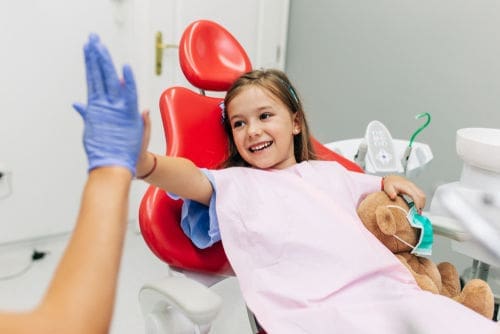Proudly serving Newton MA and surrounding towns.
Approximately 1 in 3 people have some form of anxiety or phobia related to visiting the dentist. Whether it’s due to past bad experiences, a sensitive gag reflex, or perhaps feeling claustrophobic when someone’s looking in your mouth, everyone’s reason is different.
Not surprising is that dental phobia can start during childhood. Especially when the first encounter is one that involves a painful toothache or broken tooth.

Getting Your Child Out of Pain
If your child is in pain, our top priority is to make them as comfortable as possible. Once we provide interim pain relief, we can make a plan to address the concern and prevent the discomfort from coming back. Just as important is helping to preserve their teeth, being that their mouths are rapidly developing and have many years ahead of them.
Early Care: Positive Experiences
Seeing a dentist from a young age is one of the best steps in preventing dental anxiety. The early checkups and cleanings keep care gentle and focused on prevention. If issues are detected, they can be addressed when they’re easier to manage. Routine, gentle cleanings mean that every encounter your child has in our office can be a positive one. That way if they’re ever in pain and require urgent attention, they know our office is a safe place to visit.
Preventing Dental Emergencies
For many children, dental emergencies are the first experience they have in the dental office. This negative experience (that’s linked to a painful injury) can forever create an association between dentistry and fear.
Fortunately, most dental emergencies can be prevented. Regular checkups, sports mouthguards, and treating dental problems early will reduce the chances of cracked, broken, or abscessed teeth. As nervous as your child may be to see a dentist for treatment, consider it essential to preventing a more traumatizing event later on in childhood.
The Importance of Regular Checkups
Preventative care appointments play a crucial role in minimizing tooth decay and other dental diseases. Many conditions can be reversed if they’re caught early enough. So, if your child tends to be afraid of the dentist, it actually helps to bring them more often for their exams and cleanings!
Plan to bring your child in for their first dental checkup by around the time they turn a year old. And just like adults, keep bringing them back every six months. These ongoing preventative appointments aren’t just important for keeping your child’s teeth healthy; they also allow us to develop a relationship with your family. Personal relationships are an important aspect of preventing dental anxiety in children.
Treating Problems Early
Perhaps your child has a cavity, but they aren’t experiencing any pain. Instead of waiting to see if it gets worse, it’s best to go ahead and treat the issue before your child experiences discomfort. Otherwise, whatever it is will become more complex, require additional time to treat, and potentially cause pain. Early intervention often means a more relaxing experience. We’ll thoroughly numb the tooth so that your child doesn’t have to feel a thing (laughing gas is also available!)
Keeping a Positive Attitude
One of the best ways to help your child enjoy their trip to the dentist is to keep things positive. Never mention anything like shots or drills (even if you’re explaining what isn’t going to happen) but instead use positive ways of explaining things. It can also help to “play dentist” at home, ahead of their appointment. Take turns brushing one another’s teeth, looking in their mouth with a flashlight, or smiling in the mirror.
As parents, many of us had bad dental experiences growing up. Surprisingly, our children can pick up on our own phobias. Do your best to address those as well, so that you can genuinely support your child.
If Your Child Needs Sedation
Even the most relaxed children can experience dental anxiety from time to time. Especially if they have restorative treatments that need to be completed. To help your child feel at ease, we offer nitrous oxide sedation. Also called “laughing gas”, this light sedative provides moderate analgesia so that your child can feel calm and distracted from everything else going on. And best of all, it wears off as soon as the appointment is complete. They’ll still be completely alert throughout their visit, but they just won’t care as much about what’s going on.
Experience the Difference
Contact us today to reserve an appointment for your child! We’re happy to answer any questions that you may have. Call (617) 527-6061 or request an appointment online.







